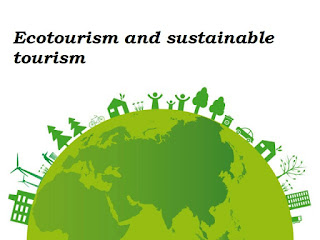Have you ever
listened to the term “green hotel”? Why don't you consider “eco-friendly tours”
or “sustainable resort”? The green travel market can be challenging to navigate
with so many conditions being thrown around.
Businesses sometimes use these
terms dishonesty in an attempt to appeal to a growing activity of conscientious
travelers devoid of actually having any environmentally or socially accountable
policies in place. Here, we hope to place some light on what these words really
signify.
Precisely
what does “green” really mean? Generally, nothing! However, the word “green”
has been used so usually and loosely in recent years that it has become diluted. Some have used the phrase green washing to explain a PR
technique in which a business sneakily promotes the understanding that their
policies are environmentally pleasant.
The term was first termed by researchers in the 1980s in a research that described the hotel industry’s exercise of placing green placards in each bedroom that encouraged visitors to reuse their towels. The research found that the hotels eventually made little to no effort to basically conserve resources or decrease waste; they just wanted to appear green in order to maximize profits.
 |
| World Ecotourism |
The term was first termed by researchers in the 1980s in a research that described the hotel industry’s exercise of placing green placards in each bedroom that encouraged visitors to reuse their towels. The research found that the hotels eventually made little to no effort to basically conserve resources or decrease waste; they just wanted to appear green in order to maximize profits.
Ecotourism tourism
Ecotourism is
described as a responsible travel to natural areas that retains the environment
and enhances the well-being of local people. While nature-based tourism is just
described traveling to natural places, ecotourism is a kind of nature-based
tourism that advantages local areas and destinations ecologically, culturally
and economically.
Ecotourism symbolizes a set of principles that have been efficiently implemented in numerous global communities and are reinforced by extensive industry and educational research. Ecotourism, when effectively executed based on these principles, indicates the benefits of socially and ecologically good tourism improvement.
 |
| Slot in Greenery |
Ecotourism symbolizes a set of principles that have been efficiently implemented in numerous global communities and are reinforced by extensive industry and educational research. Ecotourism, when effectively executed based on these principles, indicates the benefits of socially and ecologically good tourism improvement.
Sustainable
tourism
The sustainable
tourism organizations support environmental efficiency, social development, and
local financial systems. Sustainable tourism and ecotourism are identical
concepts and share a lot of the same principles, however, sustainable tourism
is wider; it covers all types of travel and destinations, from luxury to
backpacking and vibrant cities to distant rainforests.
A sustainable tourism business should also be economically sustainable in order for sustainable tourism to succeed; it has to be successful for business owners.
A sustainable tourism business should also be economically sustainable in order for sustainable tourism to succeed; it has to be successful for business owners.
Good examples
of sustainable business practices consist of conserving water and energy,
assisting community conservation tasks, recycling and dealing with wastes,
hiring staff from the regional community, paying them just salaries and
providing training, and seeking locally-produced products for restaurants and
present shops.
Sustainable tourism companies take concrete actions to improve the well-being of local communities and make favorable contributions to the efficiency of natural and cultural heritage. By doing this, they cut down on their own expenses and preserve the durability of their operation in improvement to attracting dependable travelers.
Sustainable tourism companies take concrete actions to improve the well-being of local communities and make favorable contributions to the efficiency of natural and cultural heritage. By doing this, they cut down on their own expenses and preserve the durability of their operation in improvement to attracting dependable travelers.
What’s
a traveler or visitor must do?
Despite the
fact that sustainable tourism and ecotourism are more significant terms than
green tourism, the sensible traveler shouldn’t just take these statements at
face value. Regardless of what a hotel or tour operator says about their green
experience, always investigate even more.
If you want to be 100 percent sure that a tourism company is doing what it states, opt for those that have been authorized or verified for sustainability by an impartial, third-party organization.
If you want to be 100 percent sure that a tourism company is doing what it states, opt for those that have been authorized or verified for sustainability by an impartial, third-party organization.
EmoticonEmoticon